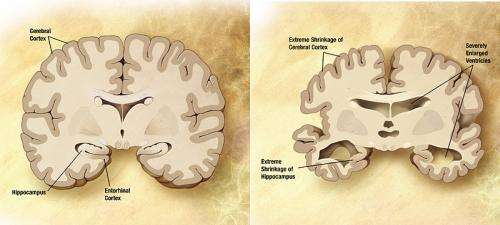May 21, 2013 report
B vitamins could delay dementia

(Medical Xpress)—Despite spending billions of dollars on research and development, drug companies have been unable to come up with effective treatments for dementia and Alzheimer's Disease (AD). Now, A. David Smith at the University of Oxford and his colleagues have discovered that, in some patients experiencing mild cognitive impairment (MCI), a cocktail of high-dose B vitamins could prevent gray matter loss associated with progression to AD. The study appears in the Proceedings of the National Academy of Sciences.
The World Health Organization predicts that between 2010 and 2050 the number of dementia cases will increase from 26 million to 115 million worldwide. Although there is an urgent demand for treatment, pharmaceutical companies have been unable to develop drugs that will delay or cure dementia. So far, approved drugs merely ease symptoms.
Smith and his team wanted to see if B vitamins reduced the risk of AD by lowering total homocysteine (tHcy) levels. There is a positive correlation between high tHcy levels and risk of cognitive impairment and AD.
The researchers studied 156 subjects over 70 in Oxford, England who suffered from MCI. The subjects received either a placebo or a high-dose B vitamin cocktail consisting of 20 milligrams of vitamin B6, 0.5 milligrams of vitamin B12 and 0.8 milligrams of folic acid.
Over a two-year period, subjects in both the experimental and control groups lost gray matter in the medial temporal, lateral temporoparietal and occipital regions and in the anterior and posterior cingulate cortex.
However, those receiving B vitamin treatment experienced significantly less atrophy in regions of the brain most affected in people with AD and people with MCI who go on to develop AD. These include the bilateral hippocampus, the parahippocampal gyrus, the retrosplenial precuneus, the lingual gyrus, the fusiform gyrus and the cerebellum. The placebo group experienced a 3.7 percent loss of gray matter in these regions, compared with a 0.5 percent loss among the experimental group.
When they looked at baseline tHcy levels, Smith and his colleagues found that B-vitamin treatment did not significantly reduce gray matter atrophy among subjects with tHcy levels below the median. The B-vitamin cocktail did have a significant effect on high-tHcy participants: those receiving the cocktail experienced only a 0.6 percent loss of gray matter, while high-tHcy participants in the placebo group experienced a 5.2 percent loss.
The team found a correlation between gray matter loss and worsening of scores on tests that measure cognitive function.
A causal Bayesian network analysis showed that B vitamins lower tHcy levels. This decreases gray matter atrophy, which delays cognitive decline.
More information: Preventing Alzheimer's disease-related gray matter atrophy by B-vitamin treatment, PNAS, Published online before print May 20, 2013, doi: 10.1073/pnas.1301816110
Abstract
Is it possible to prevent atrophy of key brain regions related to cognitive decline and Alzheimer's disease (AD)? One approach is to modify nongenetic risk factors, for instance by lowering elevated plasma homocysteine using B vitamins. In an initial, randomized controlled study on elderly subjects with increased dementia risk (mild cognitive impairment according to 2004 Petersen criteria), we showed that high-dose B-vitamin treatment (folic acid 0.8 mg, vitamin B6 20 mg, vitamin B12 0.5 mg) slowed shrinkage of the whole brain volume over 2 y. Here, we go further by demonstrating that B-vitamin treatment reduces, by as much as seven fold, the cerebral atrophy in those gray matter (GM) regions specifically vulnerable to the AD process, including the medial temporal lobe. In the placebo group, higher homocysteine levels at baseline are associated with faster GM atrophy, but this deleterious effect is largely prevented by B-vitamin treatment. We additionally show that the beneficial effect of B vitamins is confined to participants with high homocysteine (above the median, 11 µmol/L) and that, in these participants, a causal Bayesian network analysis indicates the following chain of events: B vitamins lower homocysteine, which directly leads to a decrease in GM atrophy, thereby slowing cognitive decline. Our results show that B-vitamin supplementation can slow the atrophy of specific brain regions that are a key component of the AD process and that are associated with cognitive decline. Further B-vitamin supplementation trials focusing on elderly subjets with high homocysteine levels are warranted to see if progression to dementia can be prevented.
© 2013 Medical Xpress














